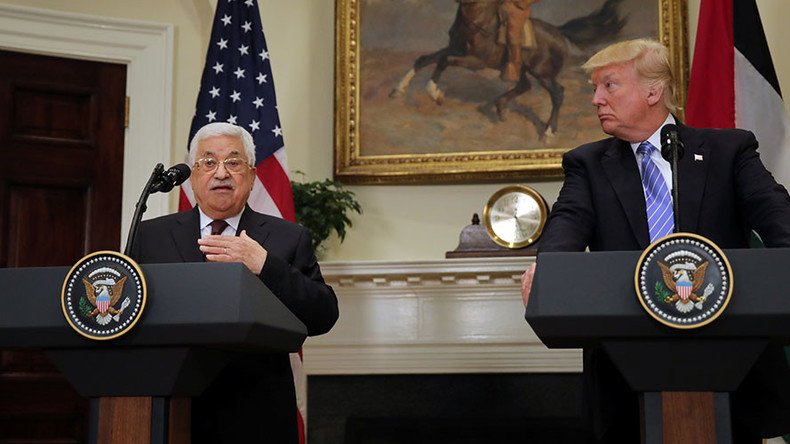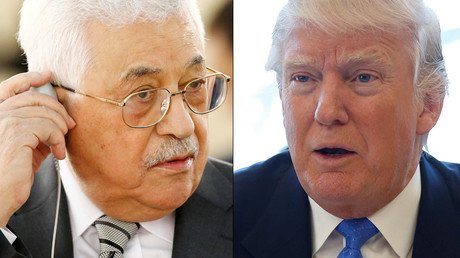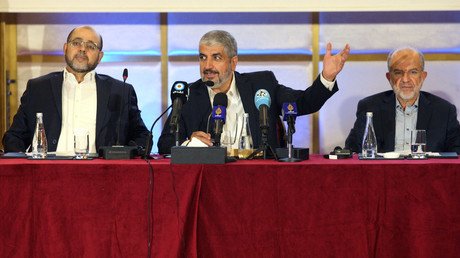Trump, Abbas express optimism about reaching ‘historic peace treaty’ with Israel in first meeting

US President Donald Trump and Palestinian Authority President Mahmoud Abbas met for the first time, expressing optimism about rebooting peace talks between Israel and the PA, facilitated by Trump, who didn’t mention the two-state solution Abbas seeks.
Trump began his remarks in the Oval Office on Wednesday by praising Abbas for his work on the “very important” 1993 agreement between the Israelis and Palestinians, called the Oslo I Accords, “which laid the foundation for peace.” Abbas was the signatory for the Palestinian Liberation Organization, and the agreement established the PA as a self-government body in 1994.
“I want to support you in being the Palestinian leader who signs his name to the final and most important peace agreement that brings safety, stability, prosperity to both peoples and to the region,” Trump said, adding that he’s committed to working with both sides to reach such an agreement, one that “cannot be imposed by the United States or by any other nation.”
The US president promised to do “whatever is necessary” to facilitate an agreement between the Palestinians and Israelis, who “must work together to reach an agreement that allows both peoples to live, worship and thrive and prosper in peace.”
“But I would love to be a mediator or an arbitrator of a facilitator, and we will get this done,” Trump added.
The US president admired the “continued security coordination” between the PA and Israel, saying he was “actually very impressed and somewhat surprised” that “they get along unbelievably well.”
Trump warned the Palestinians, though, that “there can be no lasting peace unless the Palestinian leaders speak in a unified voice against incitement to violate and violence and hate.” He also thanked Abbas for speaking out against Islamic State (IS, formerly ISIS/ISIL).
“There’s such hatred, but hopefully there won’t be such hatred for very long,” he added. “All children of God must be taught to value and respect human life and condemn all of those who target the innocent.”
Trump also outlined his administration’s efforts to create new economic opportunities for Palestinians through a “positive, ongoing partnership” between the US and the PA “on a range of issues,” including private sector development, regional security and counterterrorism. Abbas’ visit is “a demonstration of that partnership, that very special partnership that we all need to make it all work.”
The US, Abbas and the Israelis “will be working so hard” to get a peace agreement that’s “been a long time” coming, Trump vowed, turning to Abbas. “But we will be working diligently, and I think there’s a very, very good chance, and I think you feel the same way.”
READ MORE: Trump asks Netanyahu to hold off on settlements, avoids endorsing two-state solution
Abbas began his remarks, which were translated from Arabic, by expressing optimism that there will be a deal “based on the vision of the two states, a Palestinian state with its capital of East Jerusalem that lives in peace and stability with the state of Israel based on the borders of 1967.”
A two-state solution between Israel and Palestine would “give a great impetus to the Arab peace initiative,” Abbas continued, and enable his country “to fight and deter terrorism, and fight the criminal ISIS group, ISIS that… has nothing to do with our noble religion.”
'Deliberate sabotage': #Israel to build 15,000 new settlements in E. Jerusalem https://t.co/MMFYFZOCwapic.twitter.com/q0LFu9N4Kr
— RT (@RT_com) April 28, 2017
Trump, with his “great negotiating ability” will be the key to a successful and “historic peace treaty,” Abbas said, because of his determination and desire to get it done. The deal would not just be about a peaceful, two-state solution, but also about solving the issue of refugees and prisoners “according to international law.”
“It’s about time for Israel to end its occupation of our people and of our land after 50 years,” Abbas said. “We are the only remaining people in the world that still live under occupation,” and his people “want for Israel to recognize the Palestinian state, just as the Palestinian people recognize the state of Israel.”
Abbas promised that Palestinians are raising “our youth… on a culture of peace,” and that the Holy Land will become a place “where the three monotheist religions thrive… in an environment of security, peace, and stability and love for all.”
The Palestinian leader concluded his remarks by turning to Trump and saying in English: “Now, Mr. President, with you we have hope.”
Trump noted that he and Abbas have spoken with Israeli Prime Minister Benjamin Netanyahu as well as other Israeli and Palestinian leaders about moving forward with the peace process, “which hopefully will lead to peace over the course of my lifetime.”
“I’ve always heard that perhaps the toughest deal to make is the deal between the Israelis and the Palestinians,” Trump said. “Let’s see if we can prove them wrong.”
Neither leader mentioned that Hamas, the governing authority of the Gaza Strip, released a new, 42-page charter on Tuesday that explicitly discusses accepting the concept of an independent Palestinian state along the 1967 borders, marking perhaps the best acceptance of a two-state solution by Abbas’ political rivals. They also ignored that Trump is giving “serious consideration” to moving the US embassy in Israel from Tel Aviv to Jerusalem, according to Vice President Mike Pence, which would characterize a major change in American foreign policy, one that could strain relations between the US and the PA.
During a private meeting with Abbas, Trump "raised concerns about the payments to Palestinian prisoners in Israeli jails who have committed acts of terror and to their families and emphasized the need to resolve this issue,” White House press secretary Sean Spicer said.














